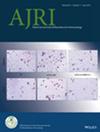Characterization of Inflammation/Immune-, Acute Phase-, Extracellular Matrix-, Adhesion-, and Serine Protease-Related Proteins in the Amniotic Fluid of Women With Early Preterm Prelabor Rupture of Membranes
Abstract
Problem
To determine whether altered concentrations of various inflammation/immune-, acute phase-, extracellular matrix-, adhesion-, and serine protease-related proteins in the amniotic fluid (AF) are independently associated with microbial invasion of the amniotic cavity and/or intra-amniotic inflammation (MIAC/IAI), imminent spontaneous preterm delivery (SPTD; ≤7 days), and major neonatal morbidity/mortality (NMM) in women with early preterm prelabor rupture of membranes (PPROM).
Method of Study
This was a retrospective cohort study involving 111 singleton pregnant women with PPROM (24–31 weeks) undergoing amniocentesis to diagnose MIAC/IAI. The following proteins were measured in stored AF samples by enzyme-linked immunosorbent assay (ELISA): APRIL, DKK-3, Gal-3BP, IGFBP-2, IL-8, VDBP, lumican, MMP-2, MMP-8, SPARC, TGFBI, TGF-β1, E-selectin, ICAM-5, P-selectin, haptoglobin, hepcidin, SAA1, kallistatin, and uPA.
Results
Multivariate logistic regression analyses revealed that (i) elevated APRIL, IL-8, MMP-8, and TGFBI levels in the AF, reduced lumican and SPARC levels in the AF, and high percentages of samples above the lower limit of quantification for AF TGF-β1 and uPA were significantly associated with MIAC/IAI; (ii) elevated AF levels of IL-8 and MMP-8 were significantly associated with SPTD within 7 days; and (iii) elevated AF IL-6 levels were significantly associated with increased risk for major NMM, when adjusted for baseline covariates.
Conclusion
ECM (lumican, SPRAC, TGFBI, and TGF-β1)- and serine protease (uPA)-associated proteins in the AF are involved in the regulation of the host response to infection/inflammation in the amniotic cavity, whereas AF inflammation (IL-8, MMP-8, and IL-6)-associated mediators are implicated in the development of preterm parturition and major NMM in early PPROM.

 求助内容:
求助内容: 应助结果提醒方式:
应助结果提醒方式:


